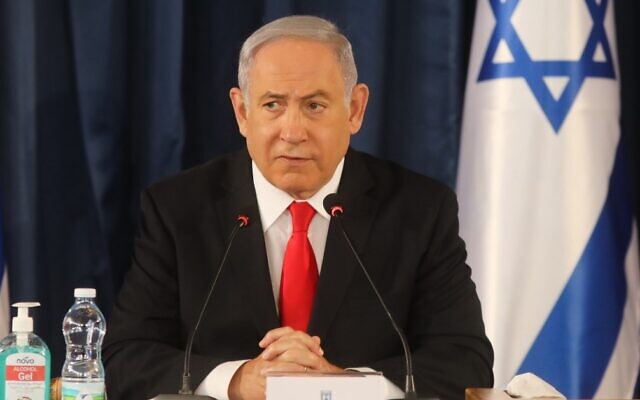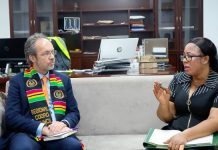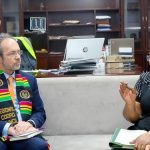
Prime Minister Benjamin Netanyahu issued a stern warming Sunday against what he called a “serious slackening in keeping the rules” aimed at preventing the spread of the coronavirus, saying that Israel was still at grave risk from the pandemic and imploring the public to do more to contain the country’s resurgent outbreak.
“As I keep saying, the virus is here. It is neither my imagination nor anyone else’s. Countries that have underestimated the danger of the epidemic and have adopted very lenient, very liberal policies have realized that there is no choice but to take steps and restrictions that we have taken at the outset, after they have seen thousands of dead,” he said, noting that the virus has claimed some 400,000 lives globally and is seeing a resurgence in some Middle Eastern countries where it was thought to have been under control.
“Anyone who says that there was no danger in the first place, or that there is no danger now, is misleading the public and encouraging behavior that endangers public health and the lives of many,” the prime minister seethed. “Part of the clear increase that we have seen in the last eight days in the rate of infection in Israel is due, as was expected, to the easing of restrictions we have made in order to open our economy. But some also stems significantly from a serious slackening in keeping the rules on masks, social distancing and hygiene.”
After a sustained drop in the daily infection rate, Israel has seen a jump in new COVID-19 cases in recent weeks, with health officials attributing much of the rise to schools. But Netanyahu said that wasn’t the whole story.
“Even as the outbreak of the Hebrew Gymnasium in Jerusalem, and the outbreak in the schools, is neutralized, we see a clear increase in many parts of the country and in many sections of the population,” he said, announcing that he would hold a meeting of the coronavirus cabinet on Monday “to consider the steps needed to overcome the outbreak, including in schools, including public transportation and other areas as well.”
The jump in new cases came after the daily infection rate steadily dropped through much of May, with Israel easing restrictions on movement, economic activity and gatherings that were put in place to contain the virus.
The government said this week it would leave most schools open but use targeted closures anywhere a coronavirus case is found. Though classes resumed last month after a two-month closure, students and teachers are required to wear face masks and are supposed to keep to strict hygiene practices.
Netanyahu, speaking alongside Defense Minister Benny Gantz, said that he and Gantz would be going from the cabinet meeting to the Biological Institute in Ness Ziona “to receive an update on the progress in efforts to find the vaccine.”
“We are all wishing and praying for these efforts to succeed, but we cannot count on them — neither on these nor on what is happening in other institutions and places around the world,” he warned, saying that “we should expect to live in the coronavirus routine for a long time.”
READ ALSO: HAITI: High covid-19 cases caused by disbelief, rumours – Report
“Without paying attention to masks, social distancing and hygiene, we will not be able to meet our goals nor will we be able to get the economy back on track. That’s why I beg of you — follow the rules for health, for life, for jobs,” he implored, adding that “in this context” the government was set to discuss the new emergency Coronavirus Law.
Officials have put together a softened version of the bill, which would introduce emergency regulations aimed at tackling the coronavirus pandemic, Justice Minister Avi Nissenkorn, of Blue and White, said on Friday.
The more tempered version of the legislative package comes after widespread outrage over the initial draft of the bill, from both the public and lawmakers, amid fears it gave the state sweeping anti-democratic powers.
Nissenkorn said that under the new draft law, police will not be allowed to enter homes without a warrant, apparently walking back one of the package’s most contentious provisions.
Among other measures, the new law will allow for declaring a state of emergency for 30 days, the Knesset will be able to cancel the state of emergency at any time, changes to the law will need Knesset approval within a week, and neighborhoods and communities can be declared a restricted zone for one week.
Netanyahu said Sunday that the law was “aimed at balancing the need to take swift action to stop the epidemic and the need to safeguard the individual rights that are precious to us all.”
























































![[FREE FREE MONEY] Predict and Win a Guaranteed GH¢200 From Us EVERY WEEK](https://wordpress.ghanatalksradio.com/wp-content/uploads/2022/02/Predict-and-Win-Final-09-03-2021-218x150.jpg)
![[Predict & Win – 8th/Oct.] WIN A Guaranteed ¢200 From Us This Week](https://wordpress.ghanatalksradio.com/wp-content/uploads/2021/10/maxresdefault-16-218x150.jpg)
![[Predict & Win – 2nd] WIN A Guaranteed ¢200 From Us This Week](https://wordpress.ghanatalksradio.com/wp-content/uploads/2021/09/maxresdefault-50-218x150.jpg)
![[Predict & Win – 25th] WIN A Guaranteed ¢200 From Us This Week](https://wordpress.ghanatalksradio.com/wp-content/uploads/2021/09/maxresdefault-36-218x150.jpg)
![[Predict & Win – 18th] WIN A Guaranteed ¢200 From Us This Week](https://wordpress.ghanatalksradio.com/wp-content/uploads/2021/09/maxresdefault-23-218x150.jpg)










![[National cathedral] See full list of churches that have contributed since 2018](https://wordpress.ghanatalksradio.com/wp-content/uploads/2020/09/Ghana-National-Cathedral-GhanaTalksRadio-100x70.jpg)
![[Omicron variant] Ghana’s total cases now 41](https://wordpress.ghanatalksradio.com/wp-content/uploads/2021/11/Omicron-Variant-Coronavirus-COVID-19-100x70.jpg)


